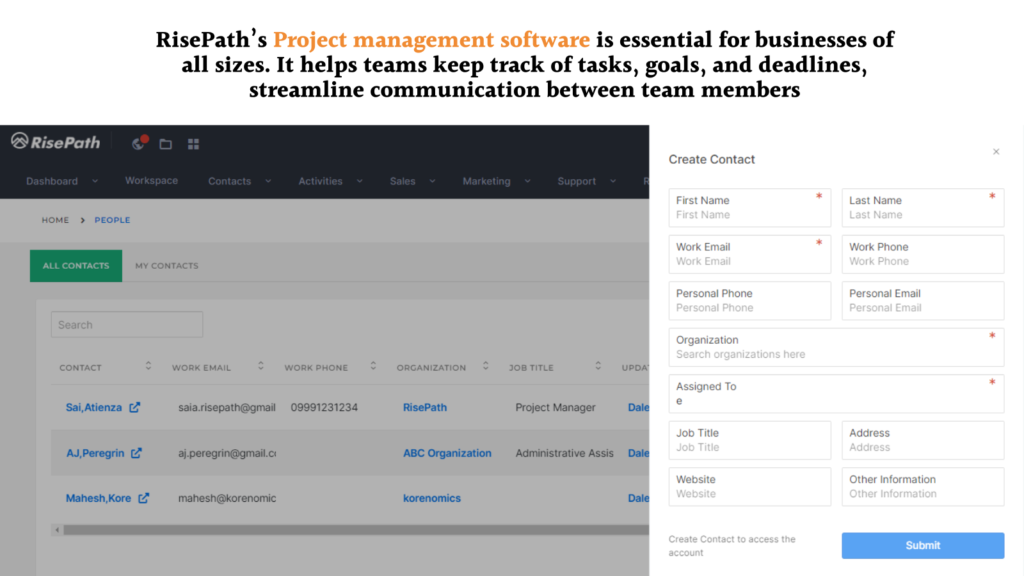One of the key advantages of using project scheduling software is its ability to streamline time and project tracking. With this software, project managers can easily create and manage schedules, assign tasks to team members, and track progress in real-time. This not only ensures that projects stay on track but also allows for better resource allocation and improved efficiency.
Project scheduling software also provides comprehensive time tracking features. It enables team members to log their hours worked on specific tasks or projects, helping businesses accurately measure the time spent on different activities. This data can be invaluable when it comes to billing clients accurately or evaluating the profitability of a particular project.
Furthermore, project scheduling software offers advanced reporting capabilities. Managers can generate detailed reports that provide insights into various aspects of the project, such as task completion rates, resource utilization, and overall progress. These reports enable stakeholders to make informed decisions based on real-time data and identify potential bottlenecks or areas for improvement.
Overall, investing in project scheduling software brings numerous benefits to organizations seeking efficient project management. From improved time tracking and accurate resource allocation to enhanced reporting capabilities – this technology empowers businesses to stay organized, meet deadlines consistently, and achieve their goals with greater ease.
What is Project Scheduling Software?

Project scheduling software is a digital tool designed to help businesses manage their projects effectively. It provides a platform for creating and managing project schedules, assigning tasks to team members, setting deadlines, and tracking progress. The software typically includes features such as Gantt charts, task lists, resource allocation, and collaboration tools.
The software works by allowing users to input project details such as tasks, deadlines, and dependencies. It then generates a visual representation of the project schedule, often in the form of a Gantt chart. This chart displays the timeline of the project, with each task represented as a bar. Users can easily see the duration of each task, its start and end dates, and any dependencies between tasks.
How Project Scheduling Software Can Benefit Your Business
Project scheduling software offers a range of benefits that can greatly impact your business operations. Firstly, it allows for accurate time and project tracking. With this software, you can easily create and manage project schedules, assign tasks to team members, and track their progress in real-time. This not only improves transparency but also enhances accountability within your organization.
Furthermore, project scheduling software enables you to effectively allocate resources and manage dependencies between tasks. By having a clear overview of the entire project timeline, you can identify potential bottlenecks or delays and take proactive measures to mitigate them.
Another significant advantage of using project scheduling software is its ability to streamline communication and collaboration among team members. With centralized access to project schedules and task assignments, everyone involved can stay on the same page and work towards common goals.
Utilizing project time tracking software allows you to analyze data related to resource allocation, task completion times, and overall productivity. These insights enable you to make informed decisions regarding future projects or process improvements.
In summary, implementing project scheduling software in your business offers numerous benefits including improved time management, enhanced collaboration, optimized resource allocation, and valuable data analysis capabilities. By leveraging this technology effectively, you can streamline your operations and drive success in your projects.
Implementing project scheduling software can bring numerous benefits to businesses of all sizes and industries. Here are some of the key advantages:
1 – Improved Efficiency
Project scheduling software helps businesses streamline their workflow by providing a centralized platform for managing projects. This eliminates the need for manual tracking and coordination, saving time and reducing the risk of errors. With all project information in one place, team members can easily access and update their tasks, ensuring that everyone is on the same page.

2. Cost Savings
By optimizing project schedules and resource allocation, businesses can reduce costs associated with overtime, unnecessary delays, and inefficient use of resources. Project scheduling software allows businesses to allocate resources effectively, ensuring that they are utilized to their full potential. This can result in significant cost savings and improved profitability.
3. Enhanced Collaboration
Project scheduling software promotes collaboration among team members by providing a platform for communication and file sharing. Team members can easily collaborate on tasks, share updates, and track progress in real-time. This improves communication and coordination, leading to better teamwork and ultimately, more successful projects.
Workflow Management with Project Scheduling Software
One of the key benefits of project scheduling software is its ability to increase efficiency and productivity within a business. By streamlining workflow and automating processes, businesses can save time and resources, allowing them to focus on more important tasks.

Project scheduling software helps businesses become more efficient by providing a centralized platform for managing projects. Instead of relying on manual tracking and coordination, teams can use the software to create schedules, assign tasks, and track progress. This eliminates the need for back-and-forth communication and reduces the risk of errors and delays.
For example, a construction company that implements project scheduling software can easily create schedules for each project, assign tasks to different teams, and track progress in real-time. This allows them to identify any bottlenecks or delays early on and take corrective actions. By streamlining their workflow and improving efficiency, the company can complete projects faster and deliver them to clients on time.
Collaboration among team members task management
Effective communication and collaboration are essential for the success of any project. Project scheduling software can greatly improve these areas by providing a centralized platform for team members to communicate, share updates, and collaborate on tasks.
With project scheduling software, team members can easily access project information, view task assignments, and communicate with each other. They can leave comments, ask questions, and share files, all within the software. This eliminates the need for lengthy email chains or in-person meetings, saving time and improving efficiency.
For example, a marketing team working on a new advertising campaign can use project scheduling software to assign tasks to different team members, set deadlines, and track progress. Team members can communicate with each other within the software, sharing updates and discussing any issues or challenges. This improves collaboration and ensures that everyone is on the same page, leading to better results.
Better Resource Management with Project Scheduling Software
Effective resource management is crucial for the success of any project. Project scheduling software can help businesses manage their resources more effectively by providing a clear overview of resource availability and allocation.
With project scheduling software, businesses can easily allocate resources to different tasks and projects. They can see which resources are available, their capacity, and any conflicts or overlaps. This allows businesses to make informed decisions about resource allocation, ensuring that resources are utilized efficiently and effectively.
For example, a software development company can use project scheduling software to allocate developers to different projects based on their availability and skills. The software provides a clear overview of each developer’s workload and availability, allowing the company to assign tasks accordingly. This ensures that resources are utilized optimally and that projects are completed on time.
Project time tracking and Monitoring Progress
Tracking and monitoring project progress is essential for ensuring that projects are completed on time and within budget. Project scheduling software provides real-time tracking and monitoring capabilities, allowing businesses to stay updated on the status of their projects.
With project scheduling software, businesses can easily track the progress of each task and project. They can see which tasks are completed, which are in progress, and which are overdue. This allows businesses to identify any bottlenecks or delays early on and take corrective actions.
For example, a manufacturing company can use project scheduling software to track the progress of each production line. The software provides real-time updates on the status of each line, allowing the company to identify any issues or delays and take immediate action. This ensures that production stays on track and that products are delivered to customers on time.
Customizable Features of Project Scheduling Software
One of the advantages of project scheduling software is its customizable features. Businesses can tailor the software to their specific needs, ensuring that it meets their unique requirements and workflows.
Also Read: The Ultimate Guide to Mastering Workflow Management for Peak Productivity
Project scheduling software typically offers a range of customizable features, such as task templates, custom fields, and user permissions. Businesses can create task templates for recurring projects or processes, saving time and ensuring consistency. They can also add custom fields to capture additional project information or track specific metrics.
For example, a design agency can use project scheduling software to create task templates for different types of design projects, such as website design or branding. The templates include predefined tasks and deadlines, saving time and ensuring that all necessary tasks are included. The agency can also add custom fields to capture client feedback or track design revisions.
Integration with Other Business Tools and Applications

Project scheduling software can integrate with other business tools and applications, further enhancing its capabilities and benefits. Integration allows businesses to streamline their workflows and improve efficiency by eliminating the need for manual data entry and duplication.
Project scheduling software can integrate with a wide range of tools and applications, such as time tracking software, collaboration platforms, and accounting systems. This allows businesses to sync data between different systems, ensuring that information is up-to-date and accurate.
For example, project scheduling software can integrate with a time tracking tool, allowing businesses to automatically import time entries into the software. This eliminates the need for manual data entry and ensures that project schedules and resource allocation are based on accurate and up-to-date information.
Why Your Business Needs Project Scheduling Software
In conclusion, project scheduling software is a powerful tool that can greatly benefit businesses of all sizes and industries. By streamlining workflow, improving communication and collaboration, and enhancing resource management, businesses can save time, reduce costs, and improve productivity.
Implementing project scheduling software allows businesses to effectively manage their projects, allocate resources, and track progress. It provides a centralized platform for creating schedules, assigning tasks, and collaborating with team members. With real-time tracking and monitoring capabilities, businesses can stay updated on the status of their projects and take immediate action if needed.
To stay competitive in today’s fast-paced business environment, businesses need to find ways to optimize their processes and improve efficiency. Project scheduling software is a valuable tool that can help businesses achieve these goals. By implementing this software, businesses can streamline their workflow, improve collaboration among team members, and ensure that projects are completed on time and within budget. So why wait? Try project scheduling software for yourself and experience the benefits it can bring to your business.

Comments are closed, but trackbacks and pingbacks are open.